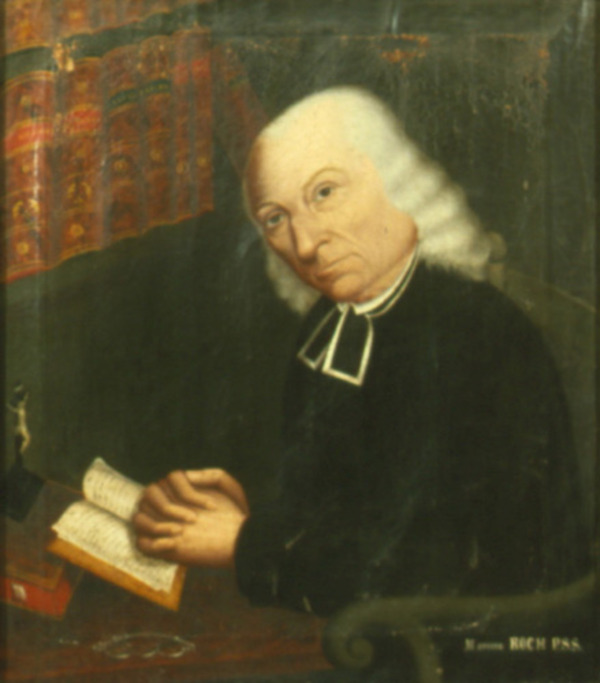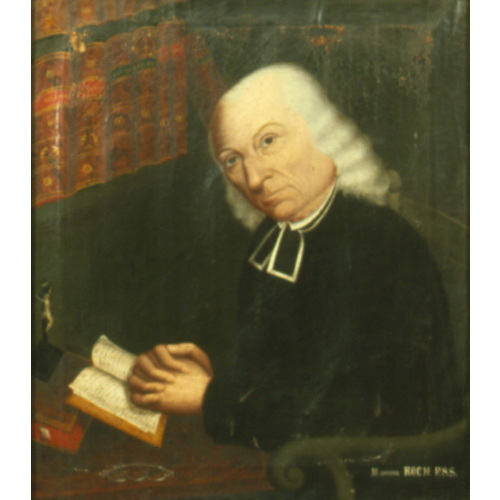
Source: Link
ROQUE, JACQUES-GUILLAUME, Sulpician, school administrator, and vicar general; b. 24 Jan. 1761 in Belmont, France, son of Guillaume Roque and Catherine Durand; d. 3 May 1840 in Montreal and was buried two days later in the crypt of the church of Notre-Dame.
In 1777 Jacques-Guillaume Roque entered the Séminaire de Saint-Charles in Toulouse, where he did all his theological studies. Subsequently he obtained a doctorate in canon law from the Université de Toulouse. After being ordained priest on 24 Sept. 1785, he asked to be admitted to the community of the Society of Saint-Sulpice as a member. He spent a year in Paris doing the solitude (noviciate) and was then sent to teach theology in the Séminaire d’Angers, becoming its director in 1789. He was already known as a man “of great merit, respected and loved by all.” Two years later he refused to take the oath of loyalty to the Civil Constitution of the Clergy. Imprisoned on 17 June 1792, he was sentenced to transportation to French Guiana. He succeeded in escaping, however, and reached Spain on 12 September. The bishop of Orense received him warmly and put him in charge of teaching theology to the clerics in the diocese.
Roque decided to come to Lower Canada in 1796. Upon his arrival at the Séminaire de Saint-Sulpice in Montreal on 24 October, he was given pastoral duties in the parish of Notre-Dame, and he was also named director of the nuns of the Hôtel-Dieu. In 1806 he became vicar general, an office he retained until his death. In October 1806 he replaced Sulpician Jean-Baptiste-Jacques Chicoisneau* as director of the Petit Séminaire de Montréal, which had been entirely rebuilt after a fire three years earlier. He remained in this post until 1828 and was responsible for drawing up several customaries as well as various regulations for the establishment. In addition, along with his colleagues Antoine-Jacques Houdet* and Claude Rivière, he prepared a French grammar and a Latin one.
On 21 Jan. 1821 Roque assisted Archbishop Joseph-Octave Plessis* of Quebec at the consecration of Sulpician Jean-Jacques Lartigue, who had been named auxiliary bishop in the district of Montreal. This appointment gave rise to a serious conflict between Lartigue and his former colleagues in the Society of Saint-Sulpice. Since he held Lartigue in high esteem, Roque adopted a neutral and prudent attitude. He had previously directed Lartigue in his theological studies and had always been generous in giving him judicious advice. At the request of his superior, Jean-Henry-August Roux*, he recorded his comments for a memorial prepared by Jean-Charles Bédard*, a Canadian Sulpician who had taken a stand against the seminary’s efforts to block the installation of Lartigue.
In October 1828 Roque became chaplain to the nuns of the Congregation of Notre-Dame. Two years later, when Roux was overwhelmed by illness and infirmities, Archbishop Bernard-Claude Panet* of Quebec asked Roque to take on the duties of superior temporarily. The celebration of Roque’s golden jubilee in the priesthood on 24 Sept. 1835 would seal the reconciliation between Lartigue and the seminary that had begun in the spring. The 8,000 faithful present in Notre-Dame were deeply moved by Roque, who during the mass offered in the presence of about 100 priests came forward “to cast himself at the bishop’s knees to renew the vows of his priesthood.” According to Father Léon Pouliot, at this moment there was truly “the union of minds and spirits, long lost, always awaited, finally found again.” Joseph-Vincent Quiblier*, superior of the Séminaire de Saint-Sulpice, provides confirmation: “None of us had seen anything greater, or more touching. Everyone, without exception, was ecstatic with admiration and joy. . . . The pope will be pleased to learn how this matter has turned out. . . . I regret none of the small sacrifices that this reconciliation has cost me. . . . People say that the bishop of Telmesse and the superior of the seminary are now at one.”
Jacques-Guillaume Roque died on 3 May 1840. On the eve of his death Bishop Lartigue had come to see him and asked him to remember “himself and his diocese” in prayers. After Roque’s death his former pupils decided to wear mourning for a month. They all recognized his great saintliness and several of them, including Lartigue, sought a piece of his cassock or a lock of hair. On 2 Feb. 1856 a young man from Montreal declared that he had been miraculously cured by a relic containing some of Roque’s hair.
ACAM, 465.101, 901.025, 901.137. AD, Aveyron (Rodez), État civil, Belmont, 25 janv. 1761. ANQ-M, CE1-51, 5 mai 1840. Arch. du séminaire de Saint-Sulpice (Paris), Circulaires des supérieurs, 1, Garnier Mollevault, 14 juin 1840; Fonds canadien, dossiers 73, 98–99, 1 1 1–14. ASSM, 1 bis, tiroir 4; 11, tiroir 47; 13, tiroir 50; 24, B; 27, tiroirs 93, 96; 49, tiroir 169. Mélanges religieux, 7 mai 1841. Allaire, Dictionnaire. F.-M. Bibaud, Dict. hist.; Le panthéon canadien (A. et V. Bibaud; 1891). [J.-) H. Gauthier, Sulpitiana ([2e éd.], Montréal, 1926). Louis Bertrand, Bibliothèque sulpicienne ou histoire littéraire de la Compagnie de Saint-Sulpice (3v., Paris, 1900), 2: 120–21. Chaussé, Jean-Jacques Lartigue. Dionne, Les ecclésiastiques et les royalistes français.
Cite This Article
Gilles Chaussé, “ROQUE, JACQUES-GUILLAUME,” in Dictionary of Canadian Biography, vol. 7, University of Toronto/Université Laval, 2003–, accessed July 18, 2025, https://www.biographi.ca/en/bio/roque_jacques_guillaume_7E.html.
The citation above shows the format for footnotes and endnotes according to the Chicago manual of style (16th edition). Information to be used in other citation formats:
| Permalink: | https://www.biographi.ca/en/bio/roque_jacques_guillaume_7E.html |
| Author of Article: | Gilles Chaussé |
| Title of Article: | ROQUE, JACQUES-GUILLAUME |
| Publication Name: | Dictionary of Canadian Biography, vol. 7 |
| Publisher: | University of Toronto/Université Laval |
| Year of revision: | 1988 |
| Access Date: | July 18, 2025 |



